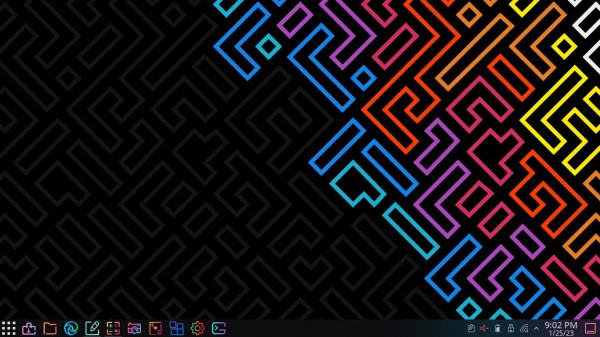I think that it might be interesting to share what we did, what we experienced, and what we learned during the Solus eclipse, and where we are now with respect to Solus and Linux in general.
Kubuntu
I installed Kubuntu 22.04 LTS on my 11-3180 in early December, intended to use it an hour or so a day through the end of January. When Solus collapsed, I kept using Kubuntu, and will continue until the new 4.x ISO is released, when I will do a clean Solus install on my 7390.
I am surprised, having used Kubuntu as a daily driver for several months, how much I like using it.
Kubuntu's Discover build is fully integrated with both Snap and Flatpak, so that both Snaps and Flatpaks update automatically, just like apps installed from the Ubuntu Main, Universe and Multivere repositories. That is a marked improvement over Solus Plasma, where I have to manually update my Flatpaks (Microsoft Edge and Zoom). Similarly, Kubuntu integrates the Linux Vendor Firmware Service (LVFS), which allowed me to update BIOS and other firmware without having to download files from Dell and execute the files. I'd like to see Solus integrate with LVFS in the future.
I elected to use the LTS version because that is what I did with Ubuntu for the course of a decade, and LTS works for me. I've found that I don't miss rolling release. On average, I get about 50-60 package and security updates a week, and I don't mind not having all my apps at the latest version.
Ricing
A grandson and I decided to do some ricing during a weekend when we were snowbound in our respective locations, using a combination of FaceTime, Zoom and a computer that I opened up for remote access so that we could tinker together. We had a lot of fun, and learned a lot about the versatility of KDE Plasma along the way. Kubuntu's Discover build includes all the Plasma Addons, logically sorted, and that made the task a lot easier than having to run to the KDE Store.
We came up with a build loosely based on Garuda, and after we were done playing, I cleaned things up and now use the theme:

My inner 15-year old thanks me.
FUBAR
A week or two later, in a fit of misplaced boredom, not using my Solus 7390 for anything else, I tried to duplicate the theme on Solus Plasma. My two Flatpaks refused to cooperate and I could not get Candy icons to stick in the menus or on the taskbar. Playing with that for a few hours, I did God-knows-what, and I no longer trust my Solus build. I will wait for the new 4.x ISO before rebuilding and returning to Solus.
Rethinking
As the weeks dragged on, I decided to follow my own advice (requirements, specifications, selection, design, implementation, support) and take a look at how I actual use my computers at this point in my life.
I realized that I use my Windows 11 desktop for heavy lifting (LibreOffice documents and spreadsheets, onboard tax preparation, graphics preparation and so on) and my various laptops for browsing and light work. In part, that is habit, but after thinking about it for a while, I realized that the division was a logical outcome of my use case, the way I store data, and reluctance to expose sensitive data on a computer that leaves the house.
Over time, I reconfigured my laptops to align with the reality of how I use them (browser, text editor, a few simple games and other small apps, and essential utilities, but nothing else) and if nothing else good came out of the Solus eclipse, aligning my computers with my use case was a benefit.
Reddit
I signed onto Reddit in early February so that I could follow r/SolusProject. I also started poking around other subreddits and quickly learned that there are a lot of strange people floating around in Reddit and I don't mean that in a good way.
I come away from Reddit exhausted with Linux fanboys. Way too much drama and way too little thought and/or perspective.
My experience with Reddit constantly reminded me how thankful I am that Solus users are decent to one another in this forum, and that is largely due to the leadership of our team.
Solus 5.0
I've thought about the direction that Josh described in his "A New Voyage" blog, and I think the direction is the right. Solus was, when I first came to Solus in 2017, an innovative and unique distro at the forefront of Linux development.
In the last few years, Solus, although remaining remarkably good in comparison to other distros I've looked at, has fallen behind the innovation curve. It seems to me that the direction the team is proposing will put Solus on the front of the curve again. I hope that the team pulls if off.